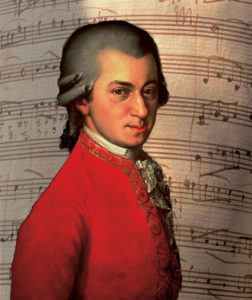 Every year since the formation of the orchestra, the Tokyo Sinfonia has performed a special concert celebrating the birthday of Wolfgang Amadeus Mozart, one of the greatest music geniuses in history. Although he lived to be only 35 years old, he produced the largest number of works by any composer which are regularly performed today.
Every year since the formation of the orchestra, the Tokyo Sinfonia has performed a special concert celebrating the birthday of Wolfgang Amadeus Mozart, one of the greatest music geniuses in history. Although he lived to be only 35 years old, he produced the largest number of works by any composer which are regularly performed today.
Mozart joined the Freemasons Lodge in Austria at the age of 28, and remained active in his beloved Lodge throughout the seven years remaining in his life. He was deeply moved by the concept of men of all walks of life meeting as equals on the floor of the Lodge, and the tenets of brotherly love, relief and truth which Masonry espouses. His Emperor was a Mason, members of the nobility were Masons, and so were his father, his friends, and some of the musicians he most esteemed.
The Mozart Birthday Concert will be presented from January 28, 2012 in the Golden Hall of the Tokyo Masonic Center. Their program will open with the Overture to The Magic Flute. Considered by many aficionados to be the finest comic opera ever written, The Magic Flute was Mozart’s irresistible tribute to Freemasonry.
Two young artists will be featured in Mozart’s Concertone (which means big concerto) for 2 Violins and Orchestra. Tomo Hirokawa was declared winner of the Tokyo Sinfonia Young Artist auditions held last month in Tokyo. Partnering her as soloist will be the Tokyo Sinfonia’s youngest member, violinist Nagisa Sakaki.
The Concertone was written when Mozart, 18, was serving as Concertmaster of the Archbishop of Salzburg’s orchestra. The Archbishop’s Vice-Kapellmeister was Mozart’s father, Leopold, an eminent violin teacher in his own right. This work was Mozart’s first effort at writing a concerto for an orchestra instrument, and presumably was first performed featuring father and son as the soloists.
The most popular symphony in the entire cannon of Mozart symphonies is his Symphony No. 40 in G Minor. A stunning work, it is enormously complex in compositional detail, yet it remains eminently approachable and supremely enjoyable. It encompasses an enormous depth of emotions, a striking sense of urgency, and harmonic complexities which presage the romantic era which he did not live to see. Interestingly, the work was performed, possibly in Mozart’s presence, in 1791 (the last year of his life) in Salieri’s concerts at the Burgtheatre in Vienna. These concerts were presented as benefit concerts for widows and orphans.

Renee Blodgett is the founder of We Blog the World. The site combines the magic of an online culture and travel magazine with a global blog network and has contributors from every continent in the world. Having lived in 10 countries and explored nearly 80, she is an avid traveler, and a lover, observer and participant in cultural diversity.
She is also the CEO and founder of Magic Sauce Media, a new media services consultancy focused on viral marketing, social media, branding, events and PR. For over 20 years, she has helped companies from 12 countries get traction in the market. Known for her global and organic approach to product and corporate launches, Renee practices what she pitches and as an active user of social media, she helps clients navigate digital waters from around the world. Renee has been blogging for over 16 years and regularly writes on her personal blog Down the Avenue, Huffington Post, BlogHer, We Blog the World and other sites. She was ranked #12 Social Media Influencer by Forbes Magazine and is listed as a new media influencer and game changer on various sites and books on the new media revolution. In 2013, she was listed as the 6th most influential woman in social media by Forbes Magazine on a Top 20 List.
Her passion for art, storytelling and photography led to the launch of Magic Sauce Photography, which is a visual extension of her writing, the result of which has led to producing six photo books: Galapagos Islands, London, South Africa, Rome, Urbanization and Ecuador.
Renee is also the co-founder of Traveling Geeks, an initiative that brings entrepreneurs, thought leaders, bloggers, creators, curators and influencers to other countries to share and learn from peers, governments, corporations, and the general public in order to educate, share, evaluate, and promote innovative technologies.








